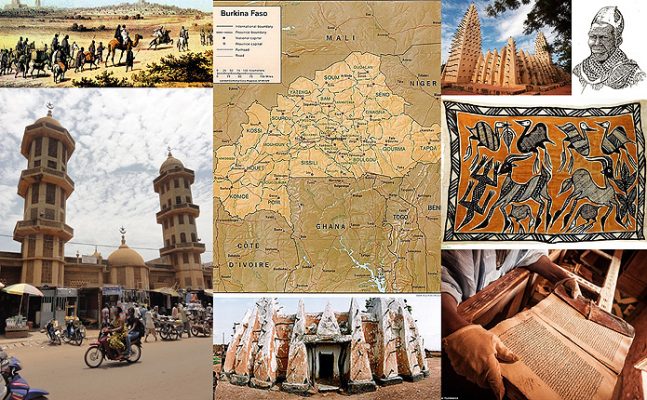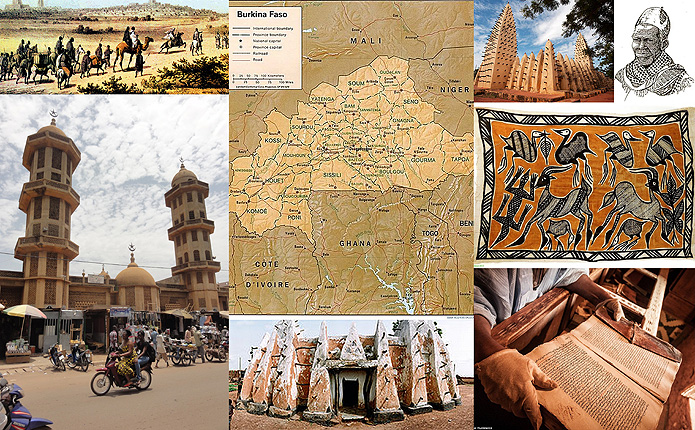

Song of Suwari: Ode to West African Scholars

Although some contemporary historians may argue otherwise, in the past, particularly in places such as West Africa, Muslims and non-Muslims lived together in relative harmony and prosperity. The positive impact of the spread of Islam on West Africa, in particular on Mali, was noticeable to explorers....

Ibn Battuta, a Moroccan traveller who is renowned as one of the greatest travellers of premodern times in the 8th century H/14th century CE, for example said in his Rihla (voyage journal):
 | the[re was] security embracing the whole country, so that neither traveller there nor dweller has anything to fear from a thief or usurper[1].” |
This peace and tolerance could be said largely due to scholars such as al-Haj Salim Suwari. Their teachings and practice in Mali as well as other parts of Sub-Saharan Africa that were under Muslim administration, saw the rise and continuation of scholarship in both the natural and religious sciences. Al-Haj Salim Suwari later became a renowned jurist and teacher[2].
In the poem below, Natty Mark Samuels, founder of African School, a Cultural Education project based in Oxford, highlights some of these themes:
Song of Suwari(The Beautiful Template)~ I ~Voices: We followed al-Hajj Suwari – Who else was there to follow? His life echoed his words, Where other lives were hollow. We flew his flag of tolerance, Coat of arms of respect. We lived amongst others – Whatever belief or sect. Bagayogo: He showed us how to live. Kamaghate: When in the minority. Voices: Al-Hajj Salim Suwari. Saganogo: Let’s take a few moments. Timitay: Pay homage to his legacy. Voices: Al-Hajj Salim Suwari. ~ II ~Saganago: I come from the lineage Saganago, Imams of the mosque of Bobo-Dioulasso. Teachers of the Koran, Traders of gold. We took his teachings into Burkina Faso. Voices: We are known as Wangara, sometimes called Dyula. Kamaghate: I come from the Kamaghate Wangara, First Imams[3] in the Kingdom of Gonja. Teachers of the Hadiths[4], Traders of kola nut. We took his teachings into Ghana. Voices: We are known as Wangara, sometimes called Dyula. Bagayogo: I come from the Bagayogo Dyula, First Imams in the state of Dagomba. Teachers of the Muwatta[5], Traders of cowrie shells. We also took his teachings into Ghana. Voices: We are known as Wangara, sometimes called Dyula. Timitay: I come from the Timitey ancestry, First Imams of Bondoukou ministry. Teachers of the Risila[6], Traders of shea butter. We took his teachings into the Coast called Ivory. Voices: We are known as Wangara, sometimes called Dyula. ~ III ~Saganago: We are tributaries of Suwari, Like the Niger has the Bani – Elements in the flow. Bagayogo: From homeland Mali. Kamaghate: To Burkina Faso. Timitay: We heard the name Saganago. Voices: Saganogo went along, Singing their song, Verses of Suwari. They went along, Dia to Kong, Chanting ballads for community. Saganago: In all his travels, Through conflict and babble, He never took up the sword. Timitay: Abhorrence of war. Kamaghate: Dismissal of violent Jihad. Bagayogo: The repairer of discord. Voices: Saganogo went along, Singing their song, Verses of Suwari. Saganago: I think of my ancestor, Muhammed al-Mustapha, Whose burial site is a shrine. Kamaghate: Died in Boron. Bagayogo: In the Ivory Coast. Timitay: His blessings are yours and mine. Voices: Saganago went along, Singing their song, Verses of Suwari. They went along, From Dia to Kong, Chanting ballads for community. ~ VI ~Kamaghate: The Kamaghate left Begho, Its Muslim quarter. My family went north, To the genesis of Gonja. We converted the king, Through the power of prayer. You can read our story, You house the first mosque in Ghana. They read an ancient Koran, Through a firelight night, In the village called Larabanga. Kamaghate: Muhammad al-Ayub, First Imam of the state. Since those early days, We have held the Imamate. Letters and accounts, Services to my neighbour. In following Suwari, Showed we could live together. Voices: Gonja, Gonja – You house the first mosque in Ghana. They read an ancient Koran, Through a fire lit night, In the village called Larabanga. ~ V ~Bagayogo: We the Bagayogo, Have travelled as he said. Into the known, As well as the dread. Saganago: Into Jenne. Timitay: Timbuktu. Kamaghate: Into Yendi. Voices: Ouagadougou. Bagayogo: Suwari said, Stay away from politics, Trickery of the slick – Neutrality is better than membership. Don’t get trapped in the net, Because you lost the bet – They’ll laugh as you slip and trip. Voices: Sulayman went to Yendi – Muhammed to Timbuktu. Bagayogo:We the Bagayogo, Obeyed the ruling man. Accepted the decrees, That didn’t offend the Koran. Sananago: Bolstered by prayer. Timitay: Hope of harmony. Kamaghate: We traversed new lands. Voices: With the guidebook of Suwari. ~ VI ~Timitay: We of the Timitay, Remember Ash Shaikh al-Akbar. Our first Imam of Bondoukou, Blessings from his khutba[8]. Kamaghate: Suwari said, Bagayogo: We shouldn’t evangelise. Saganago: Just live a good life, Kamaghate: Each day that we rise. Bagayogo: Rather than preach to them, Saganago: Let them see how we live. Voices: Why urge them with word? Let your life be a missive. Timitay: We lived in our quarter, Near the House of Allah. They came from all over, From Kong and from Bouna. Saganago: From a town in Mali, Bagayogo: Across the desert to Mecca. Kamaghate: He went there seven times, Voices: To gaze upon the Ka’aba[9]. Saganago: A man enthused by peace. Bagayogo: Spurred on by unity. Kamaghate: He left a beautiful template – Voices: So we sing the Song of Suwari. Poem by Natty Mark Samuels |  A potrait of a Soninke man (Source)  Mali Empire and surrounding states, c. 1625 (Source)  Pair of rhythm pounder, [Wood-craft figures of] Senufo people, Korhogo region [From Dia to Kong] (Source)  Forgotten: The ancient city of Chinguetti, in the west-African nation of Mauritania, is home to around 6,000 ancient manuscripts (Source) |

This is a close up view of a famous map drawn by Abraham Cresques in 1375 in Europe, which depicts Emperor Mansa Musa (Source)
References
[1] N. Levtzion and J.F. Hopkins (eds.), Corpus of early Arabic sources for West African History, Columbia University Press, 1981: 296
[2] Wilks, Ivor. “Al-Hajj Salim Suwari and the Suwarians: A Search for Sources.” Transactions of the Historical Society of Ghana, 2011. Accessed August 4, 2015. doi: 2011.
[3] A person who leads prayers in a Mosque or a title given to a Muslim leader
[4] Sayings of the Prophet Muhammad
[5]The earliest written collection of hadith regarding Muslim law, compiled and edited by the Imam, Malik ibn Anas.
[6] “Treatise” in English
[7] Translated as “The Gonja Chronicles”
[8] Friday sermon
[9] A square stone building in the centre of the Great Mosque at Mecca, the site most holy to Muslims and towards which they must face when praying.










.png)
























No hay comentarios:
Publicar un comentario